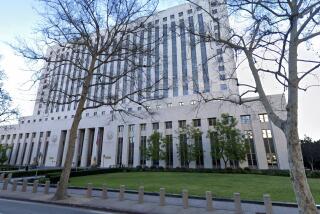‘Open Space’ Doesn’t Always Mean Forever
Deep in the canyons in and around Laguna Beach, Orange County has carved out a 4,000-acre chunk of rugged brushland, preserving it as a wilderness park for hikers and bikers.
The county is now studying a proposal to let a luxury resort developer buy or lease a swatch of this public land and turn it into an 18-hole golf course.
The beachside Montage Resort & Spa has told county officials it wanted to build an environmentally sensitive course that would extend into Aliso & Wood Canyons Wilderness Park, a county-designated wildlife sanctuary.
The nascent proposal has stirred deep concern among some environmentalists statewide who can’t recall another instance in which protected wilderness land was rolled away for a developer. Such a move could set a dangerous precedent and undercut conservation efforts elsewhere in California, they say.
It has evoked outrage in Laguna Beach, where thousands of residents once marched to save picturesque Laguna Canyon from development.
“Here we are working so hard to preserve the land, and the county is considering ceding preserved land to a golf course,” said Mary Fegraus, executive director of Laguna Canyon Foundation, a nonprofit that raised funds to set aside the 6,600-acre Laguna Coast Wilderness Park, another county park.
“It will destroy our credibility,” she said. “How can people trust that preserved land will stay protected?”
Open space, including public parks and private conservation areas, is preserved in many ways: by deeds, environmental regulations and state, county and city laws. Some restrictions are less flexible than others, but most can be revised, altered or dropped altogether.
Alaska’s National Wildlife Refuge, for instance, could be opened to oil drilling, and the Bush administration has proposed repealing some logging and development restrictions in national forests.
With regard to Aliso & Wood Canyons Wilderness Park, the Montage -- which also is planning a five-star resort in Beverly Hills -- faces such a daunting set of regulations that the golf course may prove unfeasible, county officials said.
“It will be fairly close to impossible,” said Bryan Speegle, Orange County’s planning director, but “nothing is impossible.”
Land that constitutes Aliso & Wood Canyons, a pristine expanse dotted by native oaks and sycamores, was granted to the county starting in the 1970s and ending in the early 1990s. The bulk of the park, about 3,400 acres, was donated by the firm that developed Aliso Viejo, the county’s newest city. Other developers also donated parcels over time, and the county bought some of the land with grant money.
According to the county, the donors stipulated that the property be used for open space, roads, flood control and recreation. The land was originally designated a “natural park.”
Orange County parks have several designations. “Urban regional,” for instance, allows active recreation, such as golf courses. “Wilderness park” limits uses mostly to hiking and biking. Natural parks fall somewhere in the middle. They may have picnic areas and camping sites, but not golf courses.
In 1997, the county Board of Supervisors went a step further and declared Aliso & Wood Canyons a wilderness park.
To push forward with the golf course, the Montage will have to persuade supervisors to redesignate Aliso & Wood Canyons, or a portion of it, an urban regional park.
The hotel and its backers have declined to discuss their plans in detail.
“We are still in the very preliminary stages,” said Carol Hoffman, a spokeswoman for the Athens Group, the Montage’s developer. “We are in the internal planning process. It will become very public once we have something reasonable to discuss.”
In private, however, Montage representatives have been meeting with county officials for months to discuss the potential hurdles the project faces.
County memos from those meetings obtained by The Times suggest the hotel would need to lease 60 to 80 acres of parkland from the county for fairways, greens and practice areas.
Early last year, the Montage and partners bought the 80-acre Aliso Creek Inn and Golf Course, a nine-hole facility near the mouth of Aliso Canyon. Conceptual maps of an 18-hole golf course show the new links pushing north into the wilderness park along Aliso Creek.
It is unlikely that the Montage will try to buy the parkland, said Speegle, the planning director. By state law, supervisors would have to rule that the parcel was no longer needed for parks before it could sell it. A challenge to that decision could trigger a costly countywide election.
A redesignation and lease would require only the approval of the county supervisors.
To a county still digging out from its bankruptcy a decade ago, a golf course could offer an attractive revenue stream. The county owns four golf courses that bring in nearly $3 million a year.
“Now someone like the Montage comes along with a plan that could generate funds” for the county, said Scott Ferguson, a senior project manager with Trust for Public Land, a national conservation group. “In the past they may have dismissed it; now they are looking at it. They may have some mixed feelings.”
Kevin Thomas, the county director of Harbors, Beaches and Parks division, disputed that. “We always look at a project based upon its merits ... not our budget,” he said.
But there may be other benefits, county officials concede. Aliso Creek, despite being in a wildlife sanctuary, is highly polluted from urban runoff, and its banks have suffered from years of erosion.
The local agencies do not have the funds to restore the critical waterway, said Larry McKinney, the county’s manager of watershed and coastal resources.
If the Montage offers to repair the creek as part of its golf course plan, it is worth considering, McKinney said. “We can always say no.”
Supervisor Tom Wilson, who represents the area and has met privately with Montage officials, stepped gingerly around the issue, saying he would consider the project fully when the Montage introduced a formal plan, expected sometime this year.
Those plans would have to include mitigation for habitat destroyed by the golf course, another hurdle for the Montage. Aliso & Wood Canyons park is part of a preservation area created by a state program called the Natural Community Conservation Plan.
The decade-old program is meant to streamline the granting of state and federal environmental permits for development projects in ecologically sensitive areas.
Under the program, landowners and government agencies plan development and conservation areas over large swaths of land to avoid piecemeal planning.
In 1996, the program established a 37,380-acre conservation area called the Nature Reserve of Orange County. The reserve includes Aliso & Wood Canyons Wilderness Park.
To change the environmental restrictions for the program’s area, the Montage would have to go through a complex approval process, county and state environmental officials said. And the hotel would have to replace habitat lost to the golf course by restoring another area in central Orange County but outside the Nature Reserve.
The Montage would have to clear several other restrictions as well, including a federal water quality permit because Aliso Creek is a protected waterway. The California Coastal Commission and the city of Laguna Beach, which has jurisdiction over part of the land -- including the existing nine-hole course -- would have to approve the project as well.
Some environmental groups warn that if the project is approved, it would set a regrettable precedent.
“There is already so little protected wild land, particularly near population centers,” said Joel Reynolds, a senior attorney at Natural Resources Defense Council, a national conservation group. “We can’t afford to lose any more of it to golf courses or other development.”
Others said they would reserve judgment until seeing the actual plans.
“If [the golf course] can be mitigated with even more habitat somewhere else, there may be a public benefit,” said Jim Meyer, director of the board that oversees the Nature Reserve of Orange County.
Jeff Jarvis, a mountain biker who frequently uses Aliso & Wood Canyons, said that he would welcome a balanced approach but was concerned that the private meetings between the Montage and county officials might give the developer the upper hand.
“Who is looking out for the interests of the community in those meetings?” Jarvis said.
Times staff writers Christine Hanley and Kimi Yoshino contributed to this report.
More to Read
Sign up for Essential California
The most important California stories and recommendations in your inbox every morning.
You may occasionally receive promotional content from the Los Angeles Times.






